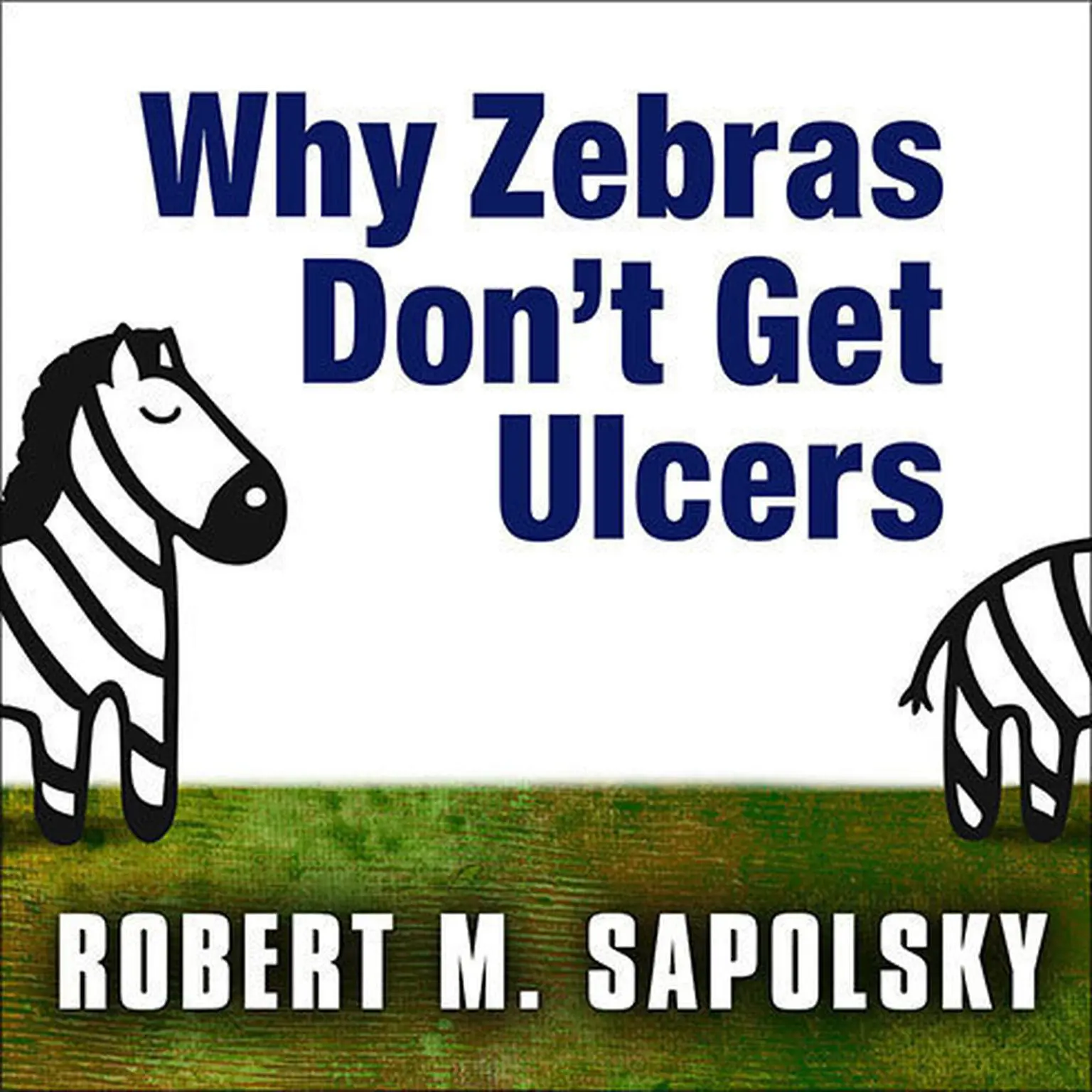 Play Audiobook Sample
Play Audiobook Sample
Why Zebras Don't Get Ulcers Audiobook
 Play Audiobook Sample
Play Audiobook Sample
Quick Stats About this Audiobook
Total Audiobook Chapters:
Longest Chapter Length:
Shortest Chapter Length:
Average Chapter Length:
Audiobooks by this Author:
Publisher Description
Now in a third edition, Robert M. Sapolsky's acclaimed and successful Why Zebras Don't Get Ulcers features new chapters on how stress affects sleep and addiction, as well as new insights into anxiety and personality disorder and the impact of spirituality on managing stress.
As Sapolsky explains, most of us do not lie awake at night worrying about whether we have leprosy or malaria. Instead, the diseases we fear—and the ones that plague us now—are illnesses brought on by the slow accumulation of damage, such as heart disease and cancer. When we worry or experience stress, our body turns on the same physiological responses that an animal's does, but we do not resolve conflict in the same way—through fighting or fleeing. Over time, this activation of a stress response makes us literally sick.
Combining cutting-edge research with a healthy dose of good humor and practical advice, Why Zebras Don't Get Ulcers explains how prolonged stress causes or intensifies a range of physical and mental afflictions, including depression, ulcers, colitis, heart disease, and more. It also provides essential guidance to controlling our stress responses. This new edition promises to be the most comprehensive and engaging one yet.
Download and start listening now!
"Make sure you get the most current edition of this book as the older versions speculate about certain causes of diseases relating to stress and we now know, for instance, that some cancers are in fact caused by viruses. This is a very well written manual discussing the hormonal pathways within the body (of mice, men and monkeys)and how they are affected by various stressors (good and bad ones)."
— Maral (4 out of 5 stars)
Quotes
-
Delightful voice pro Peter Berkrot keeps the action going with his skillful expression of the author's wry humor and nuanced intelligence. This and his sensitive way of interpreting Sapolsky's more surprising or important statements gives this lengthy audio the dramatic edge needed to make it endlessly fascinating.
— AudioFile
Why Zebras Don't Get Ulcers Listener Reviews
-
" The author does a great job explaining why chronic stress, and more importantly, our reactions to it causes the dramatic health outcomes that it does. Its well written in a language that anyone (even non-medical folks) can grasp without a feeling of "dumbing down" that lots of these types of books fall into. "
— Kimberly, 2/8/2014 -
" This was written by one of my college professors who spend half his time communing with apes. Hands down the most entertaining lecturer ever and it shows in the stories in this book. He talks about how stress literally does take a toll on our bodies in the form of heart disease, ulcers, etc. "
— Tina, 2/7/2014 -
" Interesting read...love the author's personality. "
— Lacey, 2/1/2014 -
" Stress is not our friend. Science made easy and entertaining. "
— Pattie, 1/25/2014 -
" A very detailed accounting of the science of stress with some humor throw in. I was fascinated by the details, but I could see how it might be a bit overwhelming to those not terribly familiar with human physiology. "
— Jocelyn, 1/17/2014 -
" This book helped me learn a lot about the results of stress, but nothing new about how to deal with stress. It has made me realize I need to pay more attention and make some changes in life, so for that I recommend it. Understanding the physical damage stress can do was a bit of a wake-up call. "
— Darci, 1/11/2014 -
" This will make you want to reduce the amount of stress in your life -- your body is at stake!!! "
— Gavin, 1/6/2014 -
" A must-read if you like biology. Even those who don't will have some fun. "
— Gerson, 1/3/2014 -
" A wonderful book about the origins of stress. Raises the question of whether the response mechanisms of our brains are a bit behind the times. "
— Justin, 1/2/2014 -
" A must read. Intesting and useful. About how estres change our body. "
— Yolanda, 12/17/2013 -
" Great introduction to stress physiology, even for someone without a biology background "
— Laura, 12/10/2013
About Robert M. Sapolsky
Robert M. Sapolsky is the author of several works of nonfiction, including A Primate’s Memoir, The Trouble with Testosterone, and Why Zebras Don’t Get Ulcers. He is a professor of biology and neurology at Stanford University and the recipient of a MacArthur Foundation genius grant.
About Peter Berkrot
Peter Berkrot, winner of Audie and Earphones Awards for narration, is a stage, screen, and television actor and acting coach. He has narrated over 450 works that span a range of genres, including fiction, nonfiction, thriller, and children’s titles. His audiobook credits include works of Alan Glynn, Eric Van Lustbader, Nora Roberts and Dean Koontz. In film and television, he appeared in Caddyshack, America’s Most Wanted, and Unsolved Mysteries. He performs in regional and New York theaters and directs the New Voices acting school.


























